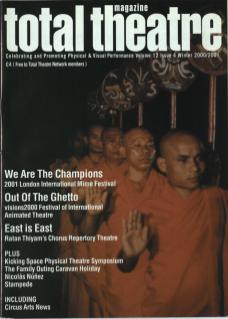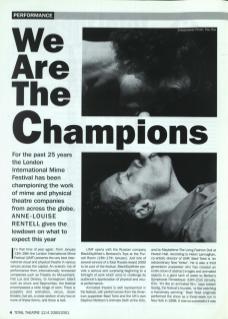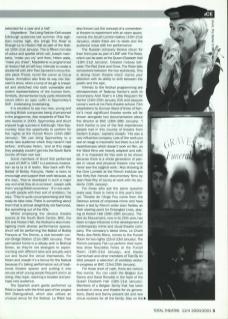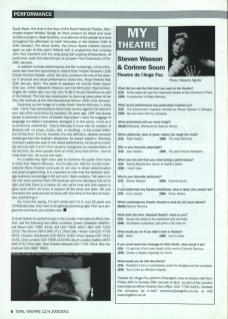It's that time of year again. From 13-28 January the London International Mime Festival (LIMF) presents the very best international visual and physical theatre in various venues across the capital. An eclectic mix of performance from internationally renowned companies such as Théâtre du Mouvement, Fiat Lux and Derevo, to homegrown talent such as Shunt and Spymonkey, the festival encompasses a wide range of work. There is puppetry and animation, circus, clown theatre, live art, a cross-section of any two or more of these forms, and there is text.
LIMF opens with the Russian company BlackSkyWhite's Bertrand's Toys at the Purcell Room (13-17 January). Just one of several winners of a Total Theatre Award 2000 to be part of the festival, BlackSkyWhite provide a serious and surprising beginning to a fortnight of work which aims to challenge its audience's appreciation of physical and visual performance.
Animated theatre is well represented in the festival, with performances from the American puppeteer Basil Twist and the UK's own Stephen Mottram's Animata (both at the ICA), and by Maybellene - The Living Fashion Doll at Hoxton Hall. According to Helen Lannaghan, co-artistic director of LIMF, Basil Twist is 'an extraordinary New Yorker'. He is also a third-generation puppeteer who has created an entire show of abstract images and animated objects in a giant tank of water to Berlioz's Symphonie Fantastique (16-21 January, ICA). 'It's like an animated film,' says Joseph Seelig, the festival's founder, ‘or like watching a Kandinsky painting.' Basil Twist originally performed the show as a three-week run in New York in 1998. It was so successful it was extended for a year and a half.
Maybellene - The Living Fashion Doll wowed Edinburgh audiences last summer. Only eighteen inches high, she brings The Road to Shangri-La to Hoxton Hall as part of the festival (20-21 January). This is fifteen minutes of colour and sparkle which will, Joseph maintains, 'make you cry' and then, Helen adds, 'make you cheer'. Maybellene is programmed at Hoxton Hall at half-hour intervals to create a double-bill with John Paul Zaccarini's circus theatre piece Throat, round the comer at Circus Space. Animation also finds its way into Zaccarini's show, when a lump of dough is kneaded and stretched into both vulnerable and violent representations of the human form. Similarly, dismembered body parts irreverently cavort within an open coffin in Spymonkey's Stiff - Undertaking Undertaking,
It is excellent to see two new, young and exciting British companies being championed in the programme. Also recipients of Total Theatre Awards in 2000, Spymonkey and Shunt enjoyed huge success in Edinburgh. Now Spymonkey have the opportunity to perform for five nights at the Purcell Room (24-28 January). ‘We can bring Spymonkey to a whole new audience which they haven't had before,' enthuses Helen, and at this stage they probably couldn't get into the South Bank Centre off their own bat.
Some members of Shunt first performed as part of LIMF in 1997 in a previous incarnation as ta ta di di teatro. Now back with The Ballad of Bobby François, Helen is keen to encourage and support their work because, as she says, 'they've developed in such a major way and what they do is so brave'. Joseph calls them ‘young British eccentrics'. 'It's nice working with people with their sort of ambition,’ he says. ‘They're quite uncompromising and they really do take risks. There is something about them that is almost delightfully old-fashioned, like something out of the 60s.’
Whilst employing the obvious theatre spaces at the South Bank Centre, BAC, the ICA and Hoxton Hall, the festival is also investigating more diverse performance spaces. Shunt will be performing The Ballad of Bobby François at The Drome, a club beneath London Bridge Station (21-28 January). Their permanent home is a railway arch in Bethnal Green, so they're not strangers to experimenting with different sites and actually went out and found the venue themselves. For Helen and Joseph it's a bonus for the festival because it's taking performance out of traditional theatre spaces and putting it into venues which young people frequent and, in so doing, they hope, reaching a broader and perhaps new audience.
The Spanish avant-garde performer La Ribot is back with the third part of her project Still Distinguished, which also utilises an unusual venue for the festival. La Ribot has also thrown out the concept of a conventional theatre to experiment with an open space, namely the South London Gallery (15-21 January), where there are no seats and the audience move with her performance.
The Russian company Derevo return for their third year as part of LIMF with The Rider, which can be seen at the Queen Elizabeth Hall (19th-21st January). Created midway between The Red Zone and Once, The Rider falls somewhere between the two stylistically. This is strong clown theatre which claims your attention with its ability to shift between the poetic and the epic.
Intrinsic to the festival programming are retrospectives of Tadeusz Kantor's work to accompany Ariel Teatr's A Little Requiem for Kantor (23-25 January, ICA) and Jacques Lecoq's work at his Paris theatre school. Film adaptations by Duncan Ward of three of Kantor's most significant theatre works will be shown alongside two documentaries about the director at BAC (26-28 January). ‘I think Kantor is one of the first experiences people had in this country of theatre from Eastern Europe,' explains Joseph. ‘His was a very influential company. Lots of the work you see on stage is mesmeric but there is a lot of repetitiveness which doesn't work on film, so the Ward films are heavily adapted and edited. It is important for this work to be shown because there is a whole generation of people in visual and physical theatre now who never saw the original work.' Also showing at the Cine Lumiere at the French Institute are two forty-five minute documentary films by Jean Noel Roy of Lecoq at work with his students (13 January).
For those who ask the same question every year, there is mime in this year's festival. Théâtre de l'Ange Fou come from the Decroux school of corporeal mime and have taken a text by French writer Jean Tardieu as their starting point for Entangled Lives, playing at Hoxton Hall (26th 28th January). Théâtre du Mouvement, now in its 25th year, has been a major influence in the development of contemporary mime and visual theatre. The company's latest show, Le Chant Perdu des Petits Riens, comes to the Purcell Room for two nights (22-23 January). The French company Fiat Lux perform their wordless show Nouvelles Folies at the Purcell Room (19-21 January), and Hayley Carmichael and other members of Told By An Idiot present a selection of wordless works in progress at BAC (23rd-25th January).
For those short of cash, there are various free events. You can catch the Belgian duo Danny and David Ronaldo in the foyer of the Queen Elizabeth Hall (19-21 January). Members of a Belgian family that has been involved in circus and theatre for six generations, David and Danny present old and new circus routines for all the family. Also on the South Bank, this time in the foyer of the Royal National Theatre, Manchester-based Whalley Range All Stars present its latest and most ambitious project, Head Quarters, to audiences of ten people at a time throughout the afternoon on both Saturdays in the festival (13 & 20 January). For circus lovers, the Circus Space Cabaret returns again as part of this year's festival with a programme that includes John Paul Zaccarini and the ping-pong ball popping Erikssonlaver, all performed under the watchful eye of compere Flick Ferdinando (27-28 January).
In addition to these performances and film screenings, mime enthusiasts also have the opportunity to attend Total Theatre Network's 10th Critical Practice Debate, which this time considers the role of the director in physical and visual performance (Voice Box, Royal Festival Hall, 20 January, 3pm). The panel of speakers will include Didier Guyon (Fiat Lux), Anton Adassinki (Derevo) and Cal McCrystal (Spymonkey). Angela De Castro also runs her How To Be A Stupid Workshop as part of the festival. This two-day introduction to clowning takes place at her Why Not Institute at the Arts Educational School (20-21 January).
Conjuring up the image of a white-faced Marcel Marceau in stripy shirt, 'mime' has connotations which have worked against the festival's own use of the word since its inception 25 years ago. LIMF has always aimed to promote a form of theatre that doesn't need the baggage of language but doesn't completely disregard it. In this sense, mime as it is commonly understood – that is Marceau's mime with his creation of illusions with no props, music, text, or anything – is the purest definition of this form. It is not, however, the only definition, despite constant challenges from the festival's detractors. As Joseph explains: ‘Marceau invented a particular style of non verbal performance, he became incredibly famous with it and it then became recognised as representative of the artform. So when people think of mime, they think of him – but it's more than him, he is just one style.'
It's a battle they fight every year to convince the public that mime is more than Marcel Marceau, but it's also one that the London International Mime Festival continues to win due to sheer determination and good programming. It is important to note that the festival's average audience percentage is 82 percent. Helen explains: 'We take it on the chin every year but that's OK because we know ultimately that we're right and that there is a reason for why we're here and that reason is good work which we know is beyond all the jokes and jibes. We just champion the work and we've stuck with the name in the face of everyone questioning it.’
You know the saying, if it ain't broke don't fix it, and 25 years and 23 festivals later, they have to be getting something right. Pick up a programme and book your tickets now.



